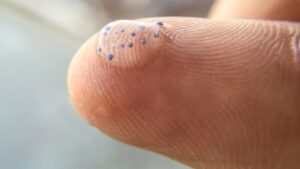
Silicone-rubber baby teats used to bottle-feed infants are frequently disinfected by moist heating. However, infant exposure to small microplastics (<10 μm) potentially released from the heated teats by hydrothermal decomposition has not been studied, owing to the limitations of conventional spectroscopy in visualizing microplastic formation and in characterizing the particles at the submicrometre scale. Here both the surfaces of silicone teats subjected to steam disinfection and the wash waters of the steamed teats were analysed using optical-photothermal infrared microspectroscopy. This new technique revealed submicrometre-resolved steam etching on and chemical modification of the teat surface. Numerous flake- or oil-film-shaped micro(nano)plastics (MNPs) (in the size range of 0.6–332 μm) presented in the wash waters, including cyclic and branched polysiloxanes or polyimides, which were generated by the steam-induced degradation of the base polydimethylsiloxane elastomer and the polyamide resin additive. The results indicated that by the age of one year, a baby could ingest >0.66 million elastomer-derived micro-sized plastics (MPs) (roughly 81% in 1.5–10 μm). Global MP emission from teat disinfection may be as high as 5.2 × 1013 particles per year. Our findings highlight an entry route for surface-active silicone-rubber-derived MNPs into both the human body and the environment. The health and environmental risks of the particles are as yet unknown.
In short this paper the following items will be explained:
– That up to 0.66mil elastomer Micro(nano)plastics (MNPs) can be ingested by babies per year;
– MNPs as small as 600nm could be measured;
– >99% match with FTIR;
– Only 0.2% spectral variability of O-PTIR (an important point for MPs analysis);
– Can different 200nm spots chemically;
– Can measure 200nm thick films.
Interested?
Download the article ‘Steam disinfection releases micro (nano)plastics from silicone-rubber baby teats as examined by O-PTIR microspectroscopy’ above.
